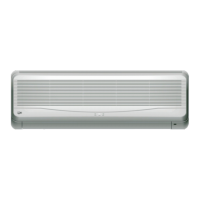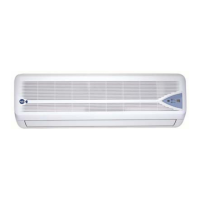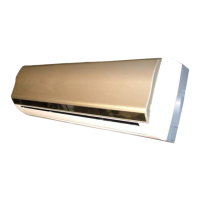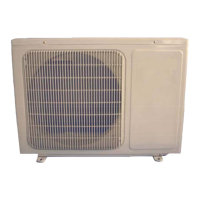32
(4)E3 -Indoor Unit coil sensor error
Cause: The detection of short circuit or open circuit of Indoor Unit
coil sensor during the inspection of Indoor Unit main PCB, indicated
by “Indoor Unit coil sensor error”.
Inspection path: Sensor→Sensor wire→Connectors→Indoor Unit
main PCB
Tools required
for inspection
Multimeter,, 5KΩ or 20KΩ standard sensoe(25℃)
Frequent
problematic part
Indoor Unit temperature sensor, Indoor Unit main PCB
Inspection
procedure and
key points
1. Check whether there’s resistance problem, short circuit or open
circuit in the sensor; the resistance value shall with a reasonable range
(about 20KΩ for frequency conversion machine)
2. Check whether the sensor wire is broken.
3. Check whether the terminal connectors are well fixed; check
whether the weld between the terminal and the main PCB is loose., and
pull the terminal slightly for inspection if necessary.
4. Check whether the sensor is affected with damp. The coil sensor is
quite easy to be affected with damp in case the lead of coil sensor is
above the copper pipe.
5. In case no standard sensor is available at present, replace the
temperature sensor of Indoor Unit coil by other sensor asides, and then
check whether the error still exists; if the error disappears, replace the
sensor; if the error still exists, check the Indoor Unit main PCB and
change if necessary.
Most Indoor Unit temperature sensors of the frequency conversion
machine have a resistance value of 20KΩ.
Do not use improper sensor during repairing and maintenance, or it
may led to the start of anti-frosting or overheat protection mode due to
wrong temperature sensing of the machine.
In case a sensor with the resistance value over 20KΩ is used, the
detected temperature will be much lower than the actual temperature,
which may lead to the high pressure of cold-blast protection system
during the heating process, or the frequent start of anti-freezing
protection during the cooling process.
n case a sensor with the resistance value below 20KΩ is used, the
detected temperature will be much higher than the actual temperature,
which may lead to the frequent start of overheat protection mode
during the heating or the overload protection during the cooling
process.
